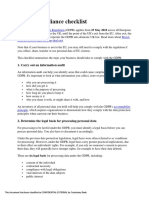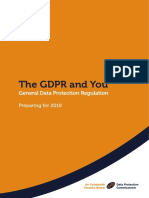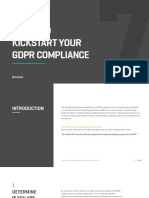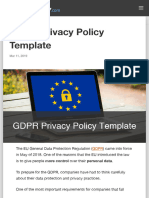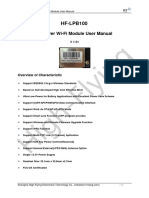0% found this document useful (0 votes)
22 views8 pagesGDPR Checklist 1
This document outlines a checklist for companies to ensure compliance with the General Data Protection Regulation (GDPR) before the May 25, 2018 deadline. It covers key areas such as data auditing, project planning, team procedures, and documentation requirements to avoid significant fines for non-compliance. The document emphasizes the importance of understanding data handling practices and implementing necessary changes to align with GDPR standards.
Uploaded by
copot56053Copyright
© © All Rights Reserved
We take content rights seriously. If you suspect this is your content, claim it here.
Available Formats
Download as PDF, TXT or read online on Scribd
0% found this document useful (0 votes)
22 views8 pagesGDPR Checklist 1
This document outlines a checklist for companies to ensure compliance with the General Data Protection Regulation (GDPR) before the May 25, 2018 deadline. It covers key areas such as data auditing, project planning, team procedures, and documentation requirements to avoid significant fines for non-compliance. The document emphasizes the importance of understanding data handling practices and implementing necessary changes to align with GDPR standards.
Uploaded by
copot56053Copyright
© © All Rights Reserved
We take content rights seriously. If you suspect this is your content, claim it here.
Available Formats
Download as PDF, TXT or read online on Scribd
/ 8


